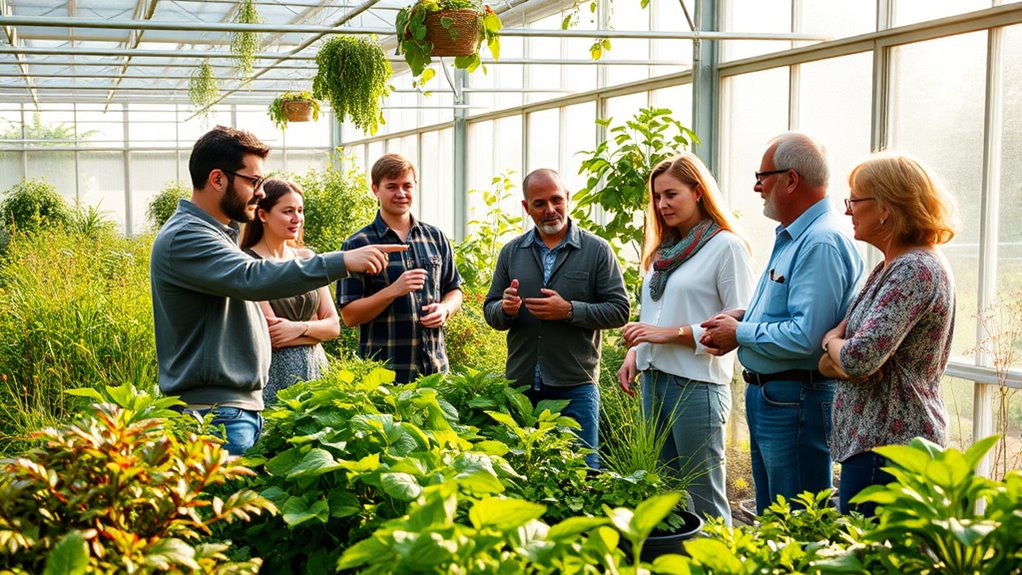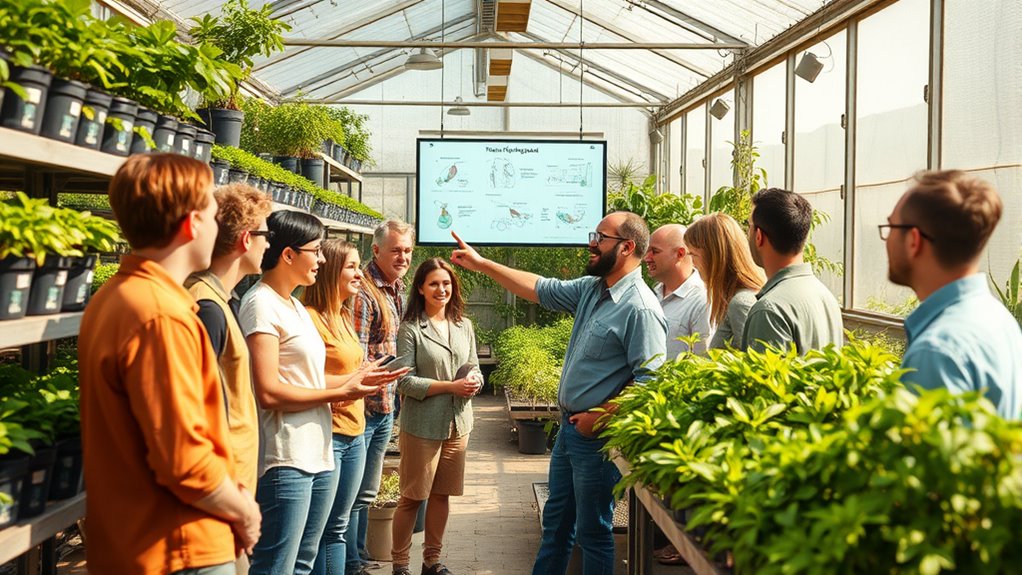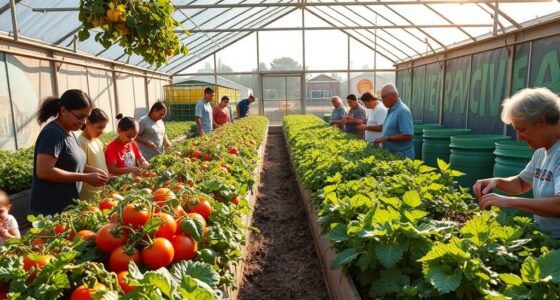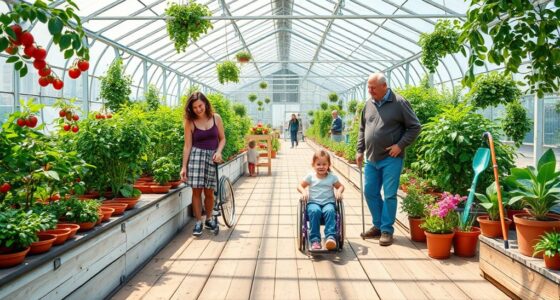To recruit and train greenhouse mentors, look for experienced, patient individuals with strong horticultural skills and good communication. Prioritize those with positive attitudes, a willingness to teach, and a track record of success. Design a thorough training program that includes hands-on activities, feedback, and mentorship best practices. Support ongoing development through regular check-ins and peer sharing. By building a community of dedicated mentors, you’ll guarantee your greenhouse thrives—learn more about creating effective mentor programs below.
Key Takeaways
- Identify experienced horticultural professionals with strong communication skills and a passion for mentoring new growers.
- Develop a comprehensive, hands-on training curriculum covering plant care, pest management, safety, and mentorship best practices.
- Provide ongoing support through regular check-ins, refresher courses, and opportunities for mentors to share experiences.
- Foster a community of mentors via peer meetings and workshops to encourage collaboration and knowledge sharing.
- Incorporate reliable resources and continuously adapt training programs to support growth and maintain high mentoring standards.

Recruiting and training greenhouse mentors is vital for fostering a supportive environment where new growers can thrive. When you begin the process, the key is effective mentor selection. You need to identify experienced individuals who not only possess strong horticultural skills but also demonstrate patience, communication skills, and a genuine willingness to teach. Look for mentors who have a track record of success and a positive attitude toward sharing their knowledge. Consider their ability to relate to beginners and their commitment to nurturing new talent. Selecting the right mentors sets the foundation for a productive training environment and guarantees that new growers receive quality guidance from the start.
Choosing experienced, patient mentors with strong communication skills builds a solid foundation for successful greenhouse training.
Once you’ve identified potential mentors, designing a thorough training program becomes your next priority. A well-structured training program design helps your mentors understand their roles and responsibilities clearly. It should cover essential topics such as plant care, pest management, greenhouse safety protocols, and effective communication techniques. Incorporate hands-on activities to reinforce learning and build confidence in practical skills. Training should also emphasize mentorship best practices, including how to provide constructive feedback, motivate new growers, and foster a collaborative atmosphere. By creating a detailed curriculum, you guarantee that mentors are well-prepared to support their mentees consistently and effectively.
In addition to initial training, ongoing support and development for your mentors are vital. Regular check-ins, refresher courses, and opportunities for mentors to share experiences help maintain high standards and adapt to new challenges. When you invest in continuous learning for your mentors, you empower them to stay updated on the latest best practices and innovations in greenhouse management. This ongoing development not only enhances their skills but also demonstrates your commitment to their growth, motivating them to stay engaged and dedicated.
Furthermore, fostering a community among your mentors encourages peer learning and collaboration. Organize periodic meetings or workshops where mentors can exchange ideas, discuss challenges, and celebrate successes. This creates a sense of camaraderie and shared purpose, which translates into more effective mentoring for your new growers. Remember, successful mentor selection and a thoughtfully crafted training program aren’t one-time efforts; they’re continuous processes that evolve as your greenhouse operation grows. By prioritizing these aspects, you set your new growers up for success and cultivate a thriving, resilient greenhouse community. Additionally, incorporating vetted resources such as portable tools and equipment can enhance the training experience and ensure mentors are equipped with reliable supplies.
Frequently Asked Questions
How Do I Identify Potential Greenhouse Mentors Effectively?
You identify potential greenhouse mentors by focusing on mentorship qualities like strong communication, patience, and a genuine passion for guiding others. Conduct candidate screening through interviews that highlight their experience, willingness to support growth, and ability to foster a positive environment. Look for individuals who demonstrate empathy and leadership, ensuring they’re committed to nurturing others’ development. This approach helps you select mentors who will effectively inspire and empower new team members.
What Are Common Challenges Faced When Training Mentors?
Training mentors can feel like herding cats, especially when maintaining motivation and consistency. You might struggle to keep their enthusiasm high, making it tough to deliver uniform training. Common challenges include varying levels of mentor motivation, which can lead to inconsistent guidance, and ensuring training stays consistent across all mentors. To overcome these, you need clear communication, regular check-ins, and ongoing support to keep everyone aligned and motivated.
How Do I Measure Mentor Program Success?
You measure mentor program success by gathering mentor feedback regularly and analyzing it for insights on effectiveness. Conduct program evaluations to assess whether mentors meet their goals and support mentees effectively. Track mentee progress and satisfaction as additional indicators. Combining feedback and evaluation results helps you identify areas for improvement, ensuring your mentor program continues to grow and delivers meaningful impacts for everyone involved.
What Resources Are Best for Ongoing Mentor Development?
You should prioritize peer feedback and leadership workshops for ongoing mentor development. Peer feedback provides real-time insights, helping you refine your skills and address challenges. Leadership workshops enhance your ability to guide others and develop your own leadership qualities. Combining these resources keeps you engaged, evolving, and better equipped to support your mentees. Regularly participating in these activities fosters continuous growth and strengthens your effectiveness as a mentor.
How Can I Motivate Mentors to Stay Engaged?
To keep mentors engaged, you should implement recognition programs that celebrate their efforts and milestones. Regularly highlight their contributions and successes to boost motivation. Additionally, foster peer support by creating a community where mentors can share experiences, advice, and encouragement. This sense of belonging and appreciation keeps them invested, motivated, and committed to their mentoring roles, ensuring ongoing engagement and a positive impact on your program.
Conclusion
By carefully recruiting and training your greenhouse mentors, you’re planting seeds for success. Think of your mentors as the sturdy trellises supporting your team’s growth, helping everyone flourish. When you invest time in selecting the right people and providing thorough training, you create a nurturing environment where skills thrive. With strong mentors guiding new members, your greenhouse becomes a vibrant, thriving space—like a garden in full bloom, full of promise and potential.










